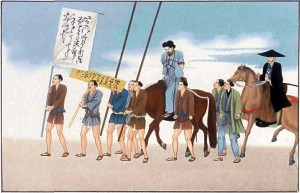Only two members in the Group of Eight industrialized nations have the death penalty–the United States and Japan. While the U.S. has a very public and very conflicted relationship with executions, Japan’s process has long been shrouded in secrecy and the cause of very little internal debate. Hiroko Tabuchi of the New York Times has an amazing and horrifying article that peeks behind the protocol and mindset that governs Japan’s system of executions, which allows for no possibility of pardon, and is often administered to convicts who’ve been coerced into confessions. It’s always perplexing when an entire nation goes along with a system that is so deeply flawed and unjust, but it happens all the time. An excerpt:
“Japan also has a 99 percent conviction rate, a figure critics attribute to widespread use of forced confessions. A series of false convictions have surfaced in recent months, including one of a 63-year-old man who had served 17 years of a life sentence for the murder of a 4-year-old girl. He was released after prosecutors admitted that his confession was a fabrication made under duress and DNA tests showed he was innocent. Critics say there is a high possibility that some of those on death row are innocent.
Inmates on death row are not told when they will be executed until the last minute–a procedure Japanese officials say prevents panic among inmates–and their family members and lawyers are informed only afterward, as are the news media.
Inmates can remain on death row as long as 40 years, though executions over the past decade have occurred on average after about 5 years and 11 months on death row, according to the public broadcast channel NHK. The Justice Ministry has refused to disclose how it makes decisions to go ahead with executions.
A large majority of Japan’s population supports capital punishment. A recent government survey showed that 86 percent of respondents are in favor of state executions for the worst crimes.
‘Any debate should take into account the lifelong suffering that the victims’ families must bear,’ said Isao Okamura, whose wife was murdered over a work dispute in 1997, in an interview with NHK.
All executions are carried out by hanging.”
Tags: Hiroko Tabuchi, Isao Okamura

